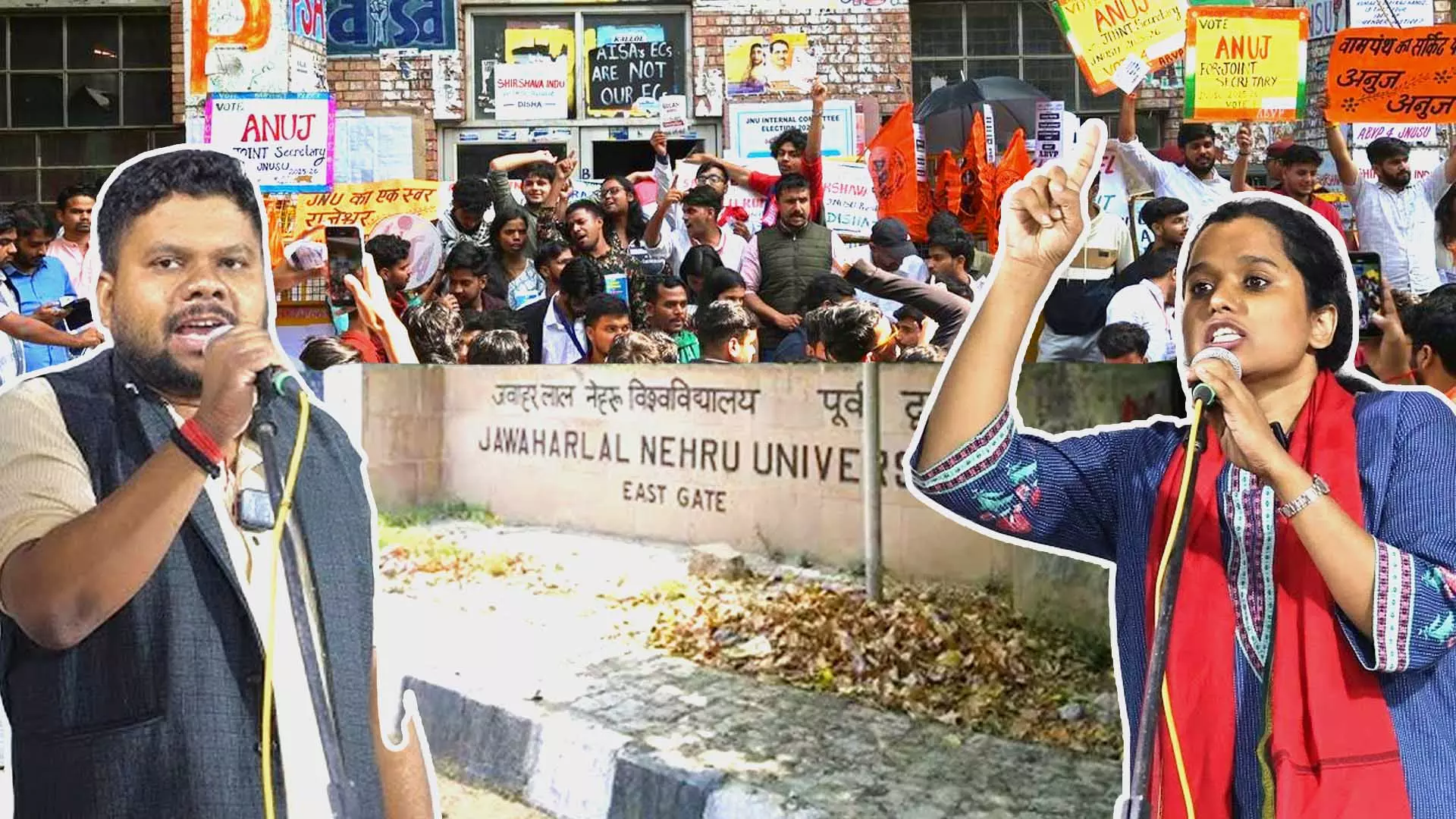
The question now is whether the United Left can reclaim all the four key posts in the JNUSU elections — or if the ABVP will finally turn years of opposition into victory.
JNUSU elections: Left-ABVP locked in fierce battle amid rising student concerns
At JNU’s student polls, united Left hopes to reclaim dominance while ABVP is pushing for breakthrough even as students want change. Who will win this battle?

Slogans echoed across the campus and daflis (hand percussion instrument) kept a steady beat at Jawaharlal Nehru University in Delhi on November 4, as students streamed into polling booths for the much-awaited JNU Students’ Union elections.
The Left and ABVP are locked in a fierce contest once again, with Congress’s NSUI and Ambedkarite groups also in the fray.
Last year, the Left vote was split after the two main Left groups on campus – AISA and SFI – chose to contest separately. This split enabled the ABVP to gain a foothold in the central panel by winning the post of joint secretary. Determined to prevent a repeat, the Left has reunited under one banner this time.
Left banks on unity
For the United Left, this election is about closing ranks and avoiding any slip-ups. Their vice-presidential candidate K Gopika Babu expressed strong confidence, noting that with SFI, AISA and DSF contesting together under the Left unity pattern, there’s little chance for the ABVP to break through either in the central panel or the councillor seats.
The united front believes the mood on the campus favours a complete sweep.
Yet, despite this optimism, the race is far from predictable. The National Students’ Union of India and the Birsa Ambedkar Phule Students’ Association are both contesting, potentially eating into the “progressive” vote.
Also read: Tensions flare at JNU as Left groups clash with police during protest against ABVP
The Progressive Students’ Association’s candidate is also expected to draw votes in the presidential race, making it a tighter contest than the Left would prefer.
ABVP hopes for change
Meanwhile, on the other side, the ABVP is banking on what it calls anti-incumbency against the Left, which has dominated JNU’s student politics for over a decade.
Its presidential candidate Vikas Patel called this a “historic election”, predicting a clean 4–0 sweep for the ABVP. He argued that while the Left has ruled for 12 years, it has failed to prioritise students’ everyday needs, focussing instead on larger ideological issues.
According to Patel, many students now see the ABVP as a credible alternative after narrow defeats in the previous polls.
Campus concerns
Beyond the political rivalry, students are raising their own concerns about the state of the university. For many, issues such as fund cuts, inadequate infrastructure, and growing campus tensions weigh heavily on their minds.
One student, Raunak Sharma, said he voted with the recent fund cuts and campus violence in mind — issues he feels define this election more than ideology.
Also read: ABVP, Left groups clash over Durga Puja procession, Ravan Dahan at JNU
Others are demanding tangible improvements in basic facilities. Samiksha, another student, stressed that JNU’s hostel infrastructure “is not really good” and hoped that whoever wins will ensure all students receive equal treatment. For many like Mehran Shah, the vote is also symbolic — an act of support for what they see as the “voice of resistance” against the erosion of campus freedoms and the rise of “fascist forces”.
Counting begins
Polling for the JNUSU elections went on till 5.30 pm on November 4, with counting set to continue through the night and results expected on November 6.
The question now is whether the United Left can reclaim all the four key posts — or if the ABVP will finally turn years of opposition into victory.
The content above has been transcribed from video using a fine-tuned AI model. To ensure accuracy, quality, and editorial integrity, we employ a Human-In-The-Loop (HITL) process. While AI assists in creating the initial draft, our experienced editorial team carefully reviews, edits, and refines the content before publication. At The Federal, we combine the efficiency of AI with the expertise of human editors to deliver reliable and insightful journalism.

